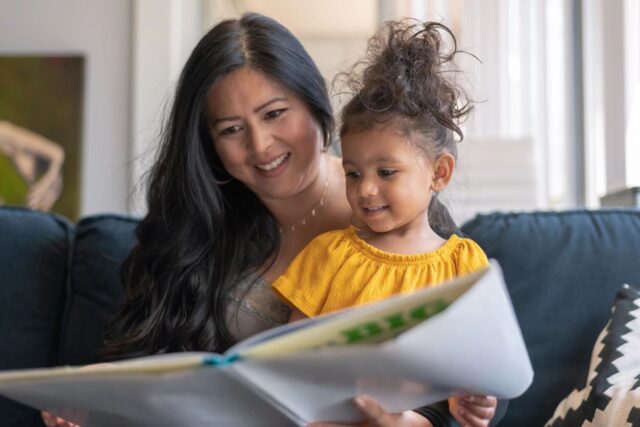Questions That Parents of English Language Learners Should Ask Schools
Questions That Parents of English Language Learners Should Ask Schools
How to make sure your child gets what they need
Clinical Expert: Claudia Rinaldi, Ph.D
en EspañolRight now, it’s more important than ever for English language learners (ELL students) to get good services from their schools. Most students will have to participate in remote learning at least some of the time. School schedules might change multiple times this year. With so many things that might get in the way of learning, ELL students need plenty of support.
To make that happen, parents of ELL students need to push schools to provide necessary services. “It’s always the parents that move mountains,” says Claudia Rinaldi, PhD, Joan Weiler Arnow ′49 Professor of Education at Lasell Univeristy and an expert in bilingual special education. With school resuming after December vacations, parents have a chance to address any issues and give kids a strong start to the rest of the year.
If you’re the parent of an ELL student, here are the questions that you should ask your child’s school as soon as possible. If you’re not sure who to ask, start by talking to your child’s school psychologist, ESL (English as a Second Language) teacher or special education teacher.
1. How will my child be evaluated?
All ELL students need to be evaluated for language proficiency. Ordinarily, these tests would take place in person. But now, they might be conducted online, which can be a challenge for teachers and administrators. Delays in testing — or testing that doesn’t accurately measure your child’s skills — might keep your child from getting the services they need in order to learn.
Dr. Rinaldi says that you should ask to have your child evaluated as soon as possible. You can ask a school representative questions like these:
- What date is my child’s language evaluation scheduled for?
- Is it possible to have the evaluation sooner?
- Can you prioritize my child for an early test?
If your child has a learning disability, make sure your child’s teachers and school psychologist know that too. It’s especially important for ELL students who have learning disabilities to be evaluated.
The other issue is that online evaluations might not measure children’s skills accurately. “Teachers may not know how to do their usual evaluations online,” says Dr. Rinaldi. “But evaluations don’t have to be standardized tests. You can do an informal oral language sample and come to the same conclusion.”
If you’re worried that your child’s evaluation may not be accurate, ask the ESL teacher or another school representative about using different methods:
- How does the online evaluation work?
- Can you do an informal evaluation?
- Can I send you a recording of my child speaking?
2. How will my student access the regular curriculum?
The exact rules vary by state, but all ELL students should have access to a regular classroom curriculum — not just a separate ESL curriculum. With remote learning, there’s a risk that the ESL teacher and the regular classroom teacher might not work together effectively.
ELL students could end up being left out of the regular classroom, or they could miss out on ESL supports. “Neither is good,” Dr. Rinaldi says. “Students need both.” Sometimes, students even end up having to learn two different sets of material because the ESL curriculum doesn’t match the regular curriculum.
To make sure your child gets access to the full curriculum and all the ESL necessary supports, try asking:
- How will ESL support be provided so that my child can access the general curriculum?
- How will the regular classroom teacher work together with the ESL teacher?
- How will the school make sure that my child does not have to learn more than one curriculum?
3. How can I get information about my child’s learning?
As the school year continues, it’s important to know how your child’s learning is going. This is especially true if they have a learning disability, since kids with learning disabilities may be more likely to lose skills during remote learning. That way, if you notice any signs of trouble, you can ask for more support.
It’s important to stay connected with teachers to get this information, especially during remote learning. “If we wait until the student fails and then ask for support, that’s way too late,” says Dr. Rinaldi. Instead, find ways to set up this connection with the teachers and counselors early in the fall. You can ask:
- Can we set up weekly meetings with the ESL teacher and an interpreter to make sure my child doesn’t fall behind?
- Can I observe my child’s online class once a week?
- Can the ESL teacher send me regular updates about how my child’s learning compares to their peers?
- What can I do at home to check on my child’s learning?
4. What should I do if I’m concerned about my child’s learning?
Challenges can come up at any time. If they do, it helps to have a plan ready. Before anything goes wrong, find out how the school can help.
“Now that you’re really seeing your child learn at home, you might notice things about their learning that you didn’t before,” says Dr. Rinaldi. “It’s important to know what to do if you notice something that could be a problem.”
Ask the ESL teacher, school psychologist or special education teacher these questions now so that you have tools to help your child later:
- Who should I talk to if I’m worried about my child’s learning? What is the best way to contact that person or people?
- How can I show that my child might have a learning issue? Can I send pictures of homework or recordings of my child speaking?
- What services will be available if my child is struggling? Does the school offer extra ESL tutoring?
Keep the conversation open
These questions are just a place to start. Other questions or concerns might come up as the school year goes on — and that’s okay! Talking openly with your child’s school might feel awkward or pushy if you’re not used to doing it, but it’s important to do it anyway.
“In American culture, it’s common to let the school know what your child needs,” says Dr. Rinaldi. By communicating with the school and teachers now, you’re setting your child up for a strong finish to the school year.
This article was last reviewed or updated on October 30, 2023.
Topics
Hannah Sheldon-Dean
Hannah Sheldon-Dean, MSW, is the former managing editor at the Child Mind Institute. She holds a BA from Brown University … Read Bio
Was this article helpful?
Related Reading
-
 Parent-Teacher Conferences: Guide for Parents
A school psychologist offers advice on nurturing this critical relationship.
Parent-Teacher Conferences: Guide for Parents
A school psychologist offers advice on nurturing this critical relationship.
-
 7 Things to Tell the Teacher About Your Child
Sharing key information can help educators make a connection
7 Things to Tell the Teacher About Your Child
Sharing key information can help educators make a connection
-
 Learning Disability Diagnosis and English Language Learners
How parents can help kids get the right support
Learning Disability Diagnosis and English Language Learners
How parents can help kids get the right support
-
 Family Resources for Remote Learning
The stress and uncertainty surrounding the coronavirus pandemic presents daily challenges to the well- being…
Family Resources for Remote Learning
The stress and uncertainty surrounding the coronavirus pandemic presents daily challenges to the well- being…
-
 Quick Guide to Language Disorder
A language disorder is a communication disorder that can affect kids. Children with a language disorder…
Quick Guide to Language Disorder
A language disorder is a communication disorder that can affect kids. Children with a language disorder…
-
 Complete Guide to Managing Behavior Problems
When children struggle with their behavior, it can have a negative impact on everyone in…
Complete Guide to Managing Behavior Problems
When children struggle with their behavior, it can have a negative impact on everyone in…
More Related




